Many thanks to kcrady for providing the inspiration for this comic.
Good Reason
It's okay to be wrong. It's not okay to stay wrong.
Category: metaphysics (page 2 of 3)
When you ask for evidence, do you get it? Or do you get a lot of tap-dancing to explain why you shouldn’t need evidence?
If the latter, then this cartoon is for you.
But that’s only one ending. There are lots of others.
- Thinking that he has a baseball gives him a sense of peace. Who are you to upset his equalibrium?
- What if you think he doesn’t have a baseball, and you’re wrong? Eternal consequences, that’s what!
- It’s not meant to be taken literally. It’s a metaphorical baseball.
- He has an amazing perfect baseball, so perfect that it doesn’t manifest itself in this physical plane. But it’s real, all right. Also, it transcends science.
- All your family thinks he has a baseball, and what will they think of you if you don’t believe in it?
- I knows that he has a baseball. I don’t just believes it; I knows it. With every fiber of my beings.
- He really does has a baseball, so give him ten percent of all your money.
Thanks to snowqueen.
Michael Shermer gave an engaging lecture Wednesday night at UWA’s Octagon Theatre. Since it was Science Week, he spoke on the scientific method, and the need for skepticism in evaluating ideas.
And I got to ask him a question. I mentioned in this post that I think he’s backed the wrong horse on the science v. religion question. In ‘Why Darwin Matters’, he seemed to lean toward the ‘Non-Overlapping Magesteria Argument’ — that science is science and spirituality is spirituality, and science can’t examine spirituality. Besides the gaping holes in the argument, it’s just an unscientific view. How can you falsify it?
But I didn’t want to fight over that — I’m sure he knows the terrain. No, I was more curious about the strategy of it all. Here was my question:
Me: I’ve enjoyed reading “Why Darwin Matters.” You give three possibilities for the relationship between science and religion. One is the Conflicting Worlds model, the Same Worlds model, and the Shared Worlds. You seem to reject the idea that science is right and religion is wrong, as an extremist position. Instead you seem to say that God is somehow outside of science.
I was wondering if that’s really your view, (audience laughter) or is this some kind of tactic that we use to lull the religious to sleep so that the grown-ups can do their work?
Shermer: A sop (unintelligible), yes. No, I do think it’s important to strategise how to interact with other people. And if you tell somebody that their most cherished beliefs are bullshit, (bright tone) and now let’s go to the ball game and have fun together! (audience laughter) You know, that isn’t probably the best way to win friends and influence people. It’s always good to try to be polite and respectful and whatever — you’re more likely to change their minds. That’s isn’t necessarily why I do it; that’s the way I am.
But the argument I make is that — that’s why I went through that whole business of aliens and Shermer’s Last Law and all that stuff. You can’t possibly find a god. Most people think of god as this supernatural being, that isn’t just some garage tinkerer, that isn’t just a genetic engineer who’s really good at it. That somehow that isn’t going to fulfill what people think when they think about god. So I really don’t… I can’t possibly imagine any experiment that any scientist could ever run and go, “Oh, look! There is a god! Wow!” Or “Nope! There isn’t, ’cause look. Failed the experiment.” Something like that. I just don’t think you could do that.
Now Dawkins makes an interesting argument in ‘The God Delusion’ about probabilities, that, you know, on a range… a scale of one to seven, what’s the likelihood? No, we can’t say for sure that there isn’t a god, but there probably isn’t. That’s a reasonable argument. But there you’re not using science directly to test the godly probabilities. It’s something slightly different than that.
Did he answer my question?
In a way, kind of. I was left with the feeling like he’s just being nice and giving religious folk on the edges a way to accept Darwin and science. Off the point, he argues that you can’t falsify the supernatural, to which I readily agree.
But this touches on what should be a major issue among atheists: How do you change people’s minds? Shermer’s right: confronting people directly about their beliefs won’t change their minds. You know what else doesn’t change people’s minds? Not confronting them directly about their beliefs. Thinking back to my days as a believer, if you’d said that I could keep my beliefs, that they were perfectly good, but that science is good too, I’ll guarantee you I’d have left the discussion thinking exactly what I was thinking before.
So what does change people’s minds? Well, in many cases, nothing. If people really want to believe in ghosts or UFO’s or Reiki, no evidence will shift ’em. But there are a certain number of smart people who are in a belief system, and eventually they’ll notice the contradictions and feel enough cognitive dissonance to reach escape velocity. For these people, we need to foster a climate where science and evidence are regarded as authoritative and where disbelief is supported (intellectually and socially), until they’re ready to make the jump. Shermer’s certainly doing his part in this by giving lectures about science and scepticism, with intelligence and good humour. I’m doing my part in this by pointing out firmly (and repeatedly) that no evidence exists for the supernatural, and inviting people to show me some. I don’t sugar-coat my point of view, but I don’t think that’ll turn anyone off; the deeply committed won’t listen anyway. And I think it’s important to be direct with people.
Education is one way of promoting good views. Ridicule is one way of discouraging bad views. I do both. If you can’t manage it, you’re only using half the tools at your disposal. But do what you’re comfortable with. I’ll be over here holding the Overton Window on my end. Go ahead and slag me off and call me a militant atheist and an extremist, so you can look moderate by comparison. That’s absolutely part of the strategy. I don’t mind; I’ll take it for the team.
Just please remember that the forces of anti-science are not content to just believe what they believe. They want to influence what everyone believes. Religions constantly expend a great deal of energy in proselyting. They send missionaries around the world, they build publishing factories, and they go about promoting their memes in an organised way. So let’s not kid ourselves that they just want to play softball.
The debate went pretty well, actually. In the Christian corner was Tim Thorburn, and the Atheist was Michael Tan.
Atheist Michael did a great job, hitting all the main points. Humans have a need to explain things, and sometimes they make explanations that involve magical beings. But we need to use evidence and reason to sort out what’s happening, and the evidence for Christianity is not particularly strong. The most electric moment: Tim said that the Bible contained predictions that have been fulfilled, and Michael responded that many others haven’t yet, especially the return of Jesus. “How long is it going to take before we realise he’s not coming back?” he said, to gasps and applause from the audience.
Christian Tim argued that Christianity was true because the Bible said so. Okay, he didn’t put it as weakly as that. He mentioned that the Bible contained eyewitness accounts of Jesus’ resurrection, and that Paul alluded to the eyewitness accounts so casually that they must have been well-accepted by the Christians of his day. So that’s the evidence.
“Except it isn’t evidence,” I said to Tim as we chatted afterwards. “It’s another claim.”
“How do you mean?” he asked.
“Well, Paul is claiming that Jesus was resurrected and that there were eyewitnesses to it. But that’s not evidence. That’s another claim, and we need to examine it.
“I mean, it’s part of the same story. You can’t use a part of the story as evidence for the story!”
“Yes, I can!” he said, looking rather surprised.
I also asked him about the Book of Mormon. At the front of every copy of the Book of Mormon, there appears the testimony of three men who claimed that an angel showed them the gold plates. There’s also the testimony of eight other men who claimed that they got to see the gold plates without any angel. I believe these testimonies to be false, to which Tim the Christian readily agreed. But if you’re going to accept the testimony of so-called eyewitnesses in the Bible, why wouldn’t you accept the testimonies of eye-witnesses in the Book of Mormon?
Tim responded that the Bible was a very reliable source of testimony because it had many different witnesses whose testimony dovetailed together so well that it couldn’t all be fiction. I’m not doing his response justice because he said it much better than I can remember, and I hope I’m getting the gist of it right — memory is unreliable. But that was basically the idea; the Bible was so much better a source for eyewitness testimony than other books because it was so complex and dense and interlocking that no one could have faked it and it must be true.
But anyone who’s heard the story of the Nottingham Lion or heard conflicting reports from eyewitnesses at accident scenes knows that eyewitness accounts are not reliable sources for what really happened. Especially when the story has had hundreds of years to get itself straightened out.
Anyway, it was a fine outing. Michael and Tim were good gentlemen to talk to. And the UWA Atheist and Agnostic Society has a Facebook group, if you’re a person of the ‘Book.
Miss Perfect and I observed the condensation on the window on a lovely morning.
“That’s odd,” said I. The streaks of water only start from a certain place.”

“The droplets must have some kind of critical mass at that part of the condensation cloud,” said Miss P.
“Or could raindrops be hitting the window only at that point?” I wondered.
We noticed that the condensation was on the inside of the window.
“Critical mass, then,” said I. “But how do we explain the bar with no streaks on the left?”
“Very strange,” said Miss P.
“Well,” said I, “I think we’ve exhausted the natural explanations and it’s time to resort… to the supernatural.”
“It must be the Window Fairy,” said she.
“Indeed,” said I. “There’s no other explanation. Now some may say that it’s just condensation. But who do they think created condensation in the first place?”
Miss P. agreed. “The Window Fairy works through condensation, in her infinite wisdom. Or his wisdom. We don’t know yet whether it’s a boy or a girl.”
“Let’s not get speculative,” said I. “It may not be important to our salvation.”
“There is still much we do not know about the Window Fairy,” said she. “But we trust that our understanding will grow as he or she reveals more about him or herself.”
I nodded. “We aren’t arrogant like scientists, thinking we know everything. One day, they too will know the truth as we do.”
Could Christianity die out within a century? This article says:
Christianity ‘could die out within a century’
Research by the Orthodox Jewish organisation Aish found that just over a third of people thought religions like Christianity and Judaism would still be practiced in Britain in 100 years’ time.
Although four in 10 people said they would choose to be a member of the Christian religion, almost the same number said they would rather practice no religion at all.
Hmm. The Extinction of the Monotheisms sounds good until you start thinking about what’s going to replace them. The poor thinking that causes religion isn’t going to go away until humans get better brains, and how long is that going to take?
The new religions are probably going to take the form of Teh Secret or something. Some kind of feel-good new-agey proto faith that doesn’t require a lot of time or commitment, but that seems to give results to those who are magically minded.
And that includes a lot of smart people. I just got an email from a smart friend who I love dearly, but he attached a PDF that he thought was wonderful. It’s called “The Master Key” by Charles F. Haanel. Here’s a link to a PDF of the first two parts only. (Even so, it’s 1.2 meg of woo.) Maybe you’d rather read about the Master Key from this site.
It has been said that The Master Key System is the book that Bill Gates read just before leaving Harvard to start his own computer software business, which made him the wealthiest man in the world.
Any evidence for the Gates tie-in?
This book holds the secret of a powerful system of success, which was used by the author, Charles F. Haanel to amass his own mega-fortune through the starting of his own company, which he built into one of the largest conglomerates of his time.
And its name is…?
The Master Key System, which was originally published in 1912, sold over 200,000 copies before it was banned by the church in 1933 and was then lost to the public for some seventy years.
Anyone’s da Vinci Code alarm going off?
The Master Key System lays down the foundation of the principles of creative manifestation through the Law of Attraction, as Haanel understood them. You will learn how to develop and use the creative instrument of your mind—creating true abundance in your life and opening up to the limitless possibilities of the truly creative life.
Wait a minute. The Law of…
It’s Teh Proto-Secret! Well, damn. I am impressed. Haanel must have been a hundred years before his time. Of course, a hundred years early on bullshit’s still bullshit.
Now, that’s not fair. I haven’t even read the thing yet, and here I am being all closed-minded. Bad critical thinker! Bad!
That’s better. Let’s take a look. Here we are, page 7.
22. We are related to the world within by the subconscious mind. The solar plexus is the organ of this mind; the sympathetic system of nerves presides over all subjective sensations, such as joy, fear, love, emotion, respiration, imagination and all other subconscious phenomena. It is through the subconscious that we are connected with the Universal Mind and brought into relation with the Infinite constructive forces of the Universe.
Well, that all seems perfaaaaauuuuggggghhhhhhhhhh…….
Sorry, part of my pre-frontal lobe just turned to goo. I think I just lost algebra.
In one paragraph, we have specious claims about the mind/body connection, conflation of emotions with autonomic nervous processes (hey, kids, did you know that your solar plexus could do all that?), a construct called the Universal Mind but no evidence for it, and enough fluffy talk to put a horse to sleep. That’s some concentrated woo there. I think the jargon to evidence ratio just approached infinity, and when that happens, we run the risk of Universe Collapse.
I’ve written about Teh Secret before. People think the Master Key or The Secret works because of confirmation bias. Sometimes you get what you want, sometimes you don’t, but if you’re focusing on it, you’ll notice when you do, and forget when you don’t. And of course, you’re much more likely to get what you want if you’re working at it than if you’re not. Nothing mystical about it, and certainly nothing to do with your solar plexus.
So I’m in the car with the ropes and the duct tape, ready to tie up my friend and subject him to the Daniel Course for Critical Thinking (which I haven’t even written yet) when I think, “Hey, what does it matter? Is it going to hurt him if he believes some woo here and there? What harm is there in a false belief?”
Here are my answers. See what you think.
1. Magical thinking leaves you susceptible to scams. Buying into a really bad premise makes it possible to buy into more. Examples?
- If you accept that supernatural beings exist, then it follows that you’d better try to find out what they want you to do. Next it’s joining and supporting a church or some other non-empirical system with your money and time. Bad idea.
- If you accept that the universe has a Consciousness, then it’s not that preposterous to think that you can influence it to get what you want. Soon, you’re trying superstitious methods to get it (which don’t work). Superstition is a waste of time, and it leaves you helpless before its purveyors.
- If gurus know the Secret of Life better than you do, then it follows that you should fork out cash to get their wisdom.
On and on. Critical thinking can save us from scammers.
2. Lack of critical thinking harms societies, not just people. A society full of delusional people is not healthy, and will have a harder time solving its problems. The more empirically-minded people we have, the more our collective knowledge grows, and the more likely we are to find working solutions to the problems that face us. I noticed this story about people who are trying to have lower petrol prices… through prayer. So far, somehow, not effective. What if everyone just prayed, instead of a) working to develop technologies for alternative energy, b) changing the way they live to conserve a bit more?
What I’m advocating is acceptance of critical thinking and rejection of superstition. Not replacement of one superstition with another. This is only going to get more important in the post-religion vacuum.
As a religious youth, I was told about Satan. The Adversary. The Tempter. The one who puts all the backwards messages in records. Mormons don’t dwell on the Devil — I heard people say it gave him more ‘power’ — but he was always there hovering around the periphery of my morality.
The Satan meme is a real mindfuck. There’s a totally evil supernatural person who wants you to do bad things. Don’t do what Satan wants. How do you know what Satan wants? It’s bad. What makes something ‘bad’? Satan wants you to do it. And round it goes. Figuring out what Satan wants you to do is like asking who the Terrists want you to vote for. Could they do the ol’ Double Reverse Psychological Fake-out? And of course, if someone starts to question the teaching of the religion, who’s been putting those thoughts into your head? Yep. Better get back in line.
Satan isn’t just a great control tool. He’s a dodge to the problem of Evil. If God’s good and in charge, why do evil things happen? For some reason, saying ‘You are evil’ wasn’t the answer people liked, so Satan did the trick. Why is there evil? Satan. There you go. God is still good, but he wants to see if you’ll follow him or the Devil.
P.S. You are evil.
And it answered a whole lot. Why do ouija boards seem to work? Satan (or one of his many helpers) is moving the table thing. Why do I want to do bad things? You’re being tempted by Satan, he’s putting thoughts into your head. (Another mindfuck. An invisible person is putting thoughts in my head? Scary!) Why are there so many religions? Satan is deceiving people and leading them astray. Satan Satan Satan. Very useful. If he didn’t exist, we’d have to invent him.
As it seems we did. This page tells how Satan doesn’t appear to be much of a character in early Hebrew lore (talking snakes notwithstanding). The Hebrew word s’tn simply means ‘adversary’ or ‘opposer’. In 1 Samuel 29:4, it tells how the Philistines mistrusted David, fearing that he would be a ‘satan’, or someone who would oppose them. Only later after the Hebrews ran into the Persians with their Zoroastrian dualism did Satan become an actual character, and for a while there he and the Lord were pretty chummy (see Job).
For me, Satan’s undoing was when I ran into this page about the Ouija Board that church leaders so straitly charged me not to play with.
Some users believe that paranormal or supernatural forces are at work in spelling out Ouija board answers. Skeptics believe that those using the board either consciously or unconsciously move the pointer to what is selected. To prove this, simply try it blindfolded for some time, having an innocent bystander take notes on what words or letters are selected. Usually, the results will be unintelligible.
So the church leaders were right, but they had the wrong reason. You shouldn’t play with the thing, but because it’s stupid, not satanic. A scary spiritual phenomenon had a perfectly sane material explanation. I wonder what else does, thought I.
I reviewed my knowledge of the Horned One, and found that he’s usually held responsible for three things:
- Temptation
- Deception
- Possession
But, you say, what about reality TV?
That falls under ‘Possession’.
Let’s take them one by one.
Temptation. Do people really think that a spirit being is somehow… what, whispering to you? And then you want to do bad things? How would that happen? This has the whiff of dissociation. Why not take responsibility for your own desires?
Deception. Well, the world is a confusing place. It’s easy to be mistaken. But I’ve found that the one who deceives me the most is good old me. No need to blame an invisible being.
Possession can be explained these days by mental illness, though it must have seemed devilishly scary to people in New Testament times.
In short, everything that people blame Satan for can be explained simply, materially, and non-mysteriously, leaving Satan as rather extraneous. Our theory works just as well without him. Occam’s Razor claims another victim.
Once I’d got that settled, it was the beginning of the end for supernaturalism. Turn it around, and suddenly everything we thought god did turns out to be the product of natural forces. No gods. No devils. No angels or demons. Just gravitation, evolution and us, working for good or ill. But then I suppose that’s just what Satan would want me to think.
A true believer in the audience isn’t satisfied. But if there’s no Satan, he wails, then why is the world getting worse and worse?
It’s not, but with that attitude I suppose you can make it as bad as you want.
Here are two beliefs that are widely held by Latter-day Saints (and I’m guessing more than a few Christians):
1. We can make decisions by praying and getting ‘impressions’ or ‘revelations’ about what to do.
2. Satan tries to trick us into thinking that good is evil, and evil good.
So when you get a personal revelation that something’s good, it could be actually good (in which case you should do it), or it could be Satan telling you it’s good (and you shouldn’t). How can you tell the difference? What if Satan is pulling the ol’ reverse psychology and making you think it’s bad so you won’t do it, but it’s actually good? Or perhaps a triple reverse whammy? How about when something’s difficult or you hit a snag in your plan? Are you facing opposition from Satan and you should keep going, or is it the Lord giving you a signal that you should stop?
It’s a tough question, so I’ll make it multiple choice.
a) I know because of the feelings of the Spirit.
And of course, your feelings can never be wrong. Feelings of the Spirit confer infallibility upon the feeler. Try again.
b) I know because it’s in line with the scriptures.
Your interpretation of the scriptures, a contradictory hodgepodge of fables. You can find anything and its opposite there. Next!
c) If you don’t know the difference, you must have sinned, and are in the grip of the Evil One. Try getting an exorcism.
Tried it. Still possessed, but I’m learning to live with it. Got anything else?
d) It’s silly to do things based on the supposed desires of a hypothetical being.
Hmm. Answer d’s looking good.
The problem here is the opacity of the metaphysical. If I have two physical explanations for something, it’s possible to determine which is right experimentally. But if there are two metaphysical explanations for something (is it Jehovah or Zeus?), then there’s no way to determine which explanation is better. Not that this stops people from trying. They examine feelings, events, and unusual happenings in order to scry the divine will. But it’s superstition and it doesn’t work.
I must be the last person to read “Why Darwin Matters” by Michael Shermer. I like Shermer, and I enjoyed “Why People Believe Weird Things”. So this book is a general explanation of evolution and a takedown of creationist arguments. It also gets into recent legal actions where ID activists, having come up empty on the science, are attempting to wedge creationism into schools. It’s a fun and interesting read.
But I’ve run aground on this bit where Shermer argues that religious people can ‘believe’ in evolution. He mentions the three possibilities for how science and religion can interact:
- the ‘Conflicting-Worlds’ model: science and religion is describing the same thing, and one must be wrong
- the ‘Same-World’ model, where science and religion are both describing aspects of the same thing, and both do a good job of it
- and the ‘Separate-Worlds’ model (which is basically the ‘Non-Overlapping Magisteria’ argument): that science describes the physical world, religion describes the spiritual, and this can work because the two don’t converge.
Inexplicably, Shermer plumps for the ‘Separate-Worlds’ model:
Believers can have both religion and science as long as there is no attempt to make A non-A, to make reality unreal, to turn naturalism into supernaturalism. Thus, the most logically coherent argument for theists is that God is outside time and space; that is, God is beyond nature — super nature, or supernatural — and therefore cannot be explained by natural causes. God is beyond the dominion of science, and science is outside the realm of God.
And there the chapter ends.
Shermer is careful here. He’s arguing that this is the only plausible road that theists can take, without saying he’s taking that road himself. And yet, by leaving it there, he’s making it sound approving.
You could take a Carnival cruise ship through the holes in the NOMA argument. Okay, if God is outside time and space, he’s outside time and space. What’s he doing creating planets, then? Or dictating books, or appearing to prophets, or healing the sick, or finding your car keys? As soon as he interacts in the physical world like believers claim he constantly is, then the two realms collide, and we can examine things to check for goddy effects. (None so far; keep you posted.)
Not surprisingly, I’m an unabashed ‘Conflicting-Worlds’-ist. But check out Shermer’s paragraph on it:
This “warfare” approach holds that science and religion are mutually exclusive ways of knowing, one being right and the other wrong. In this view, the findings of modern science are always a potential threat to one’s faith and thus they must be carefully vetted against religious truths before acceptance; likewise, the tenets of religion are always a potential threat to science and thus they must be viewed with skepticism and cynicism. The conflicting-worlds model is embraced by extremists on both sides of the divide. Young Earth creationists, who insist that all scientific findings must correlate perfectly with their own (often literal) reading of Genesis, retain a suspicious hostility of science, while militant atheists cannot imagine how religion could contribute anything positive to human knowledge or social interaction.
To read Shermer erecting the scarecrow of militant extremist atheism is particularly disappointing.
I’m sure Shermer knows this terrain, which makes his support for NOMA all the more baffling. Is he trying to trick the rubes into thinking that evolution’s okay? In that case, what you’ll get is people making a nominal committment to science being okay, while being ignorant of what science is, or any of its implications. Which seems kind of dishonest to me.
The film ‘Fitna’ is a really nasty and biased piece of inflammatory, manipulative garbage made by a right-wing anti-immigration asshole.
I’ve decided to link to it here for three reasons.
1. LiveLeak took it down temporarily because of death threats. Fuck that. Fuck anyone using threats and intimidation to control what we see and hear.
2. The people featured in the film really did say the things they said, and it’s reasonable to expose them to the light.
3. I’m aware that there are nice moderate Muslims, just like there are nice moderate Christians and nice moderate Jews. I’m also aware that there are scriptures in the Quran (Bible, etc.) that urge peace and shun violence. But you know what? It doesn’t matter. How peaceful a religion is depends on who’s running it at the time. Even if a religion is currently completely nice, there will always be some ‘bad scriptures’ lurking in there, waiting for some weirdo to interpret in their own violent way. It’s only a matter of time. Tick tick tick.
And when enough people believe their interpretation, they’ll take planes into buildings, and kill people for not believing. They’ll even murder their own children because of the extremist view. And there’s no way to reason them out of it — the delusion is fixed.
This is why moderate religionists are just as responsible for extremism as the extremists. The problem is god-belief. If people believe that a supernatural being exists, and wants them to do certain things, then their belief can be co-opted by anyone convincing. If not now, then when the climate changes. The line is not between the moderate and the extremist. It’s between the rationalist and the supernaturalist.
Recent Posts
- Shitgibbon frequencies
- Trump and The Sound of Music
- Circular reasoning and prayer
- Free de-baptisms
- Chat with JW’s: Why the atonement is incoherent.
- Daniel font rundown, November 2015
- For all my Mormon Facebook friends
- Response to a Facebook friend, re: exclusion of LDS kids in gay families
- About that rock…
- Jesus on the park bench, revised
Categories
Archives
© 2024 Good Reason
Theme by Anders Noren — Up ↑
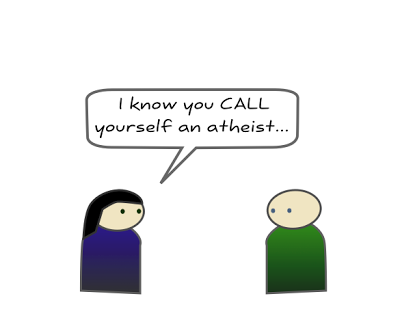

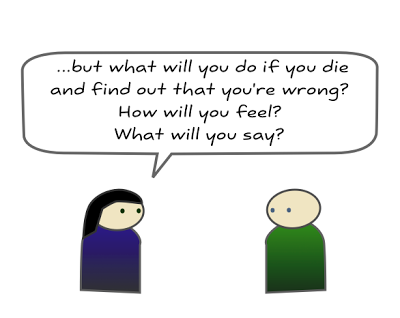
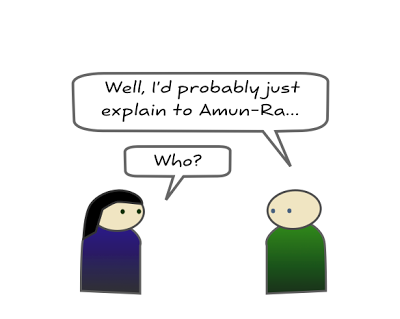

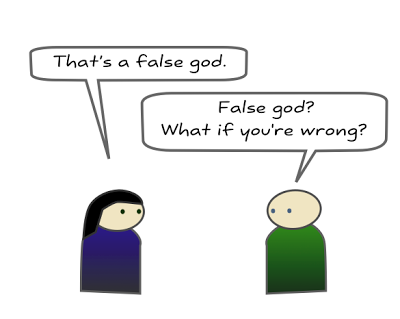
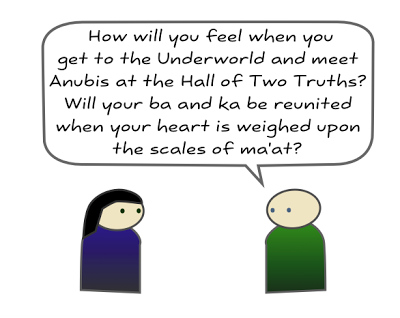
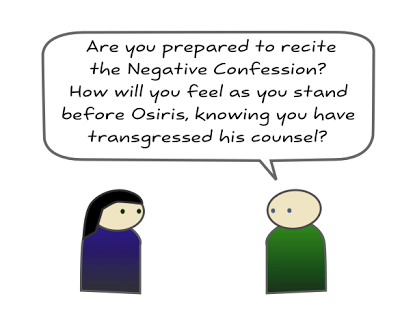
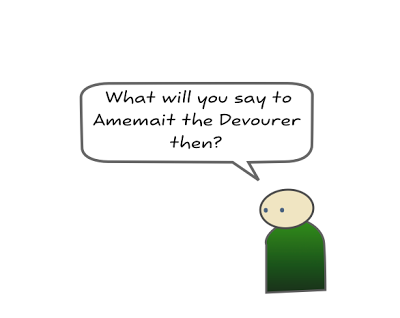
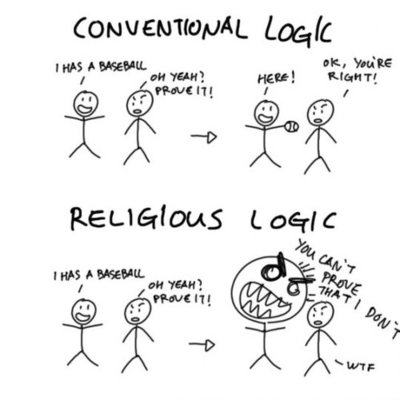


Recent Comments